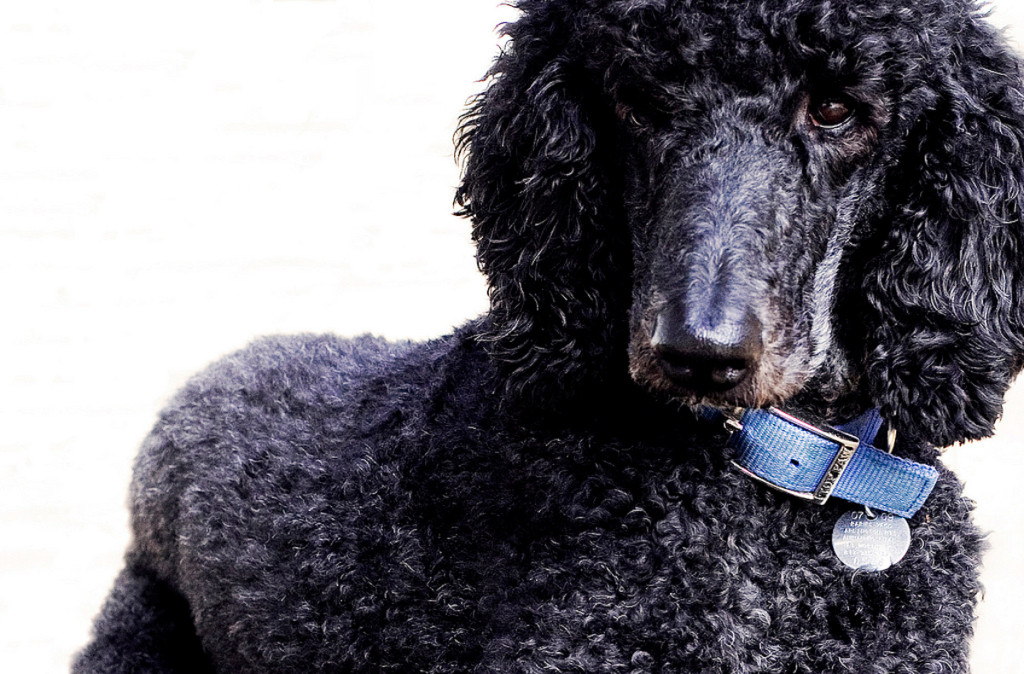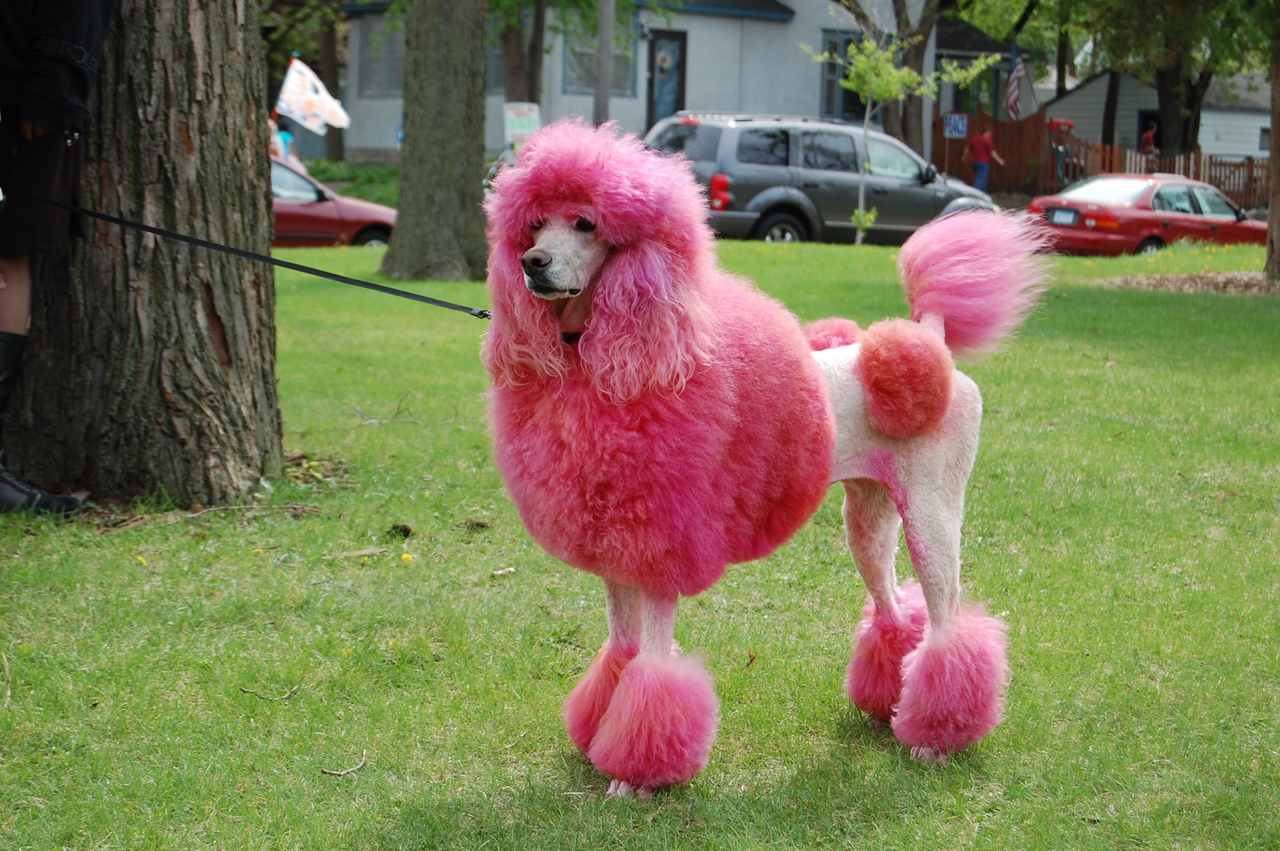Often called the Chien Canne (reed dog), the Caniche, Pudel or the Barbone, the Poodle is a famous, popular dog breed known for elegance, pride and intelligence. While the American Kennel Club recognizes Miniature Poodles, Toy Poodles and Standard Poodles, these three dogs are considered members of one breed, since smaller Poodles are simply Standard Poodles bred to be smaller. Although many Poodles become show dogs, they also make an excellent family pet, even in families that have children.
Origin
Although the Poodle may not look like it, these dogs were bred to work as water retrievers, and they are thought to be descendants of the Hungarian Water Hound and the Barbet. The exaggerated, elaborate trims that are often seen on these Poodles in the show ring were adapted from trims originally developed to help these dogs work as water dogs. Since they have a dense coat, the coat was often shaved to improve speed and progress in the water, but it was left in certain areas to protect and offer warmth. In the past, the Standard Poodle also was used to help sniff out prized mushrooms known as truffles, which are still a culinary delicacy today. Long before the 18th century, this breed was very common in Europe, especially in the countries of France, Germany and Spain. Over time, three different varieties of Poodles have become accepted, including the Standard, Miniature and the Toy, but they still are a single breed.
Appearance
Standard Poodles are proud dogs with a square, elegant carriage. They range between medium and large sizes and have a wiry, curly, thick coat. These dogs boast a rounded skull and a long muzzle, and their ears are wide set and hang very close to their head. They generally have dark, oval eyes, although certain Poodles, including those with apricot, brown or café-au-lait coloring, may have amber eyes. Usually, the tail is docked to about half its length. The Poodle boasts a level topline that has a small depression just behind the dog’s withers.
Although this breed has a thick, dense coat, they don’t shed a lot. Their coat comes in various colors, such as blue, café-au-lait, cream, brown, apricot, black, gray, white and silver. Gray, silver, black, white and blue dogs have eye rims and noses that are black. Dogs that are brown, apricot or café-au-lait boast liver eye rims and noses.
Standard poodles are supposed to stand at least 15 inches tall at their shoulders. Shorter dogs aren’t permitted to compete as Standards in the show ring. Generally, these dogs weigh between 45-70 pounds, and their weight should be proportionate to their size.
Temperament
Sometimes the Poodle is thought to be a “sissy,” but this breed is not as fragile as some people may expect. They are very friendly and outgoing and enjoy romping and running. Since they love playing, they are great family dogs that will love playing with the kids. However, they love curling up to relax and cuddle with the family when they are tired. Since they are curious and alert, they make great watchdogs, and they will bark to alert their owner if an animal or person approaches.
Failing to exercise a Standard Poodle regularly may result in some negative behavioral problems. They require vigorous activity each day or they may resort to destructive or anxious behavior. Not only do they need to be exercised physically, but these intelligent dogs require mental stimulation as well. It’s important to give Poodles interesting activities to engage in each day to challenge their mind. This breed likes having a peaceful environment and chaos, yelling and tension may stress a Poodle.
Poodles are easy to train, and they will catch on very quickly to most types of training. Some treats and praise are enough to motivate these dogs as you train them. However, it’s important to avoid treating Poodles harshly, since they will stop listening to your commands. They rarely test the patience of their trainer or owner, since they are such natural learners. After going through basic obedience training, this breed will do well with trick training, agility training and advanced obedience training. Since they love to think and they’re so intelligent, they love having the chance to learn new, exciting things.
Grooming
Shedding isn’t a problem for poodles, even if their hair is long and dense, which makes them a great dog choice for people who have allergies. For show Poodles, only a few specific grooming styles are allowed, including Continental, English saddle and puppy styles. However, if you’re simply keeping your Poodle as a pet, you can have your poodle shaved, trimmed or clipped in any style that you prefer.
No matter what style you choose, a Poodle must be regularly brushed. Even though they don’t shed, their hair is constantly growing, which can result in tangles or matting if loose hair is not brushed out and removed. Trimming and bathing must be done every 3-4 weeks, and while it’s possible to learn to clip a Poodle yourself, most people find that it’s easier to have a professional groomer take care of these grooming issues. Indoor Poodles may also require monthly nail trims, and ears and teeth should be cared for on a weekly basis.
Working Roles
Even though the Poodle was originally bred to be a water dog, most Poodles do not have working roles today. Many Poodles are shown in competitive shows. Some Poodles have worked in Hollywood, appearing on television shows and in movies, such as “EastEnders,” “Travels with Charley” and “The Silence of the Lambs.”
Health
A Standard Poodle lives 10-15 years on average, but they do have several health concerns of which owners must be aware. Common health concerns to look out for include hip dysplasia, progressive retinal atrophy, epilepsy, renal disorders, skin problems, patellar luxation, thyroid issues and von Willebrand disease. The most common illness reported among Poodles is Addison’s disease, although gastric dilation volvulus is the second most common disease reported in this breed. If you have concerns about these health issues, talk to your local veterinarian.


